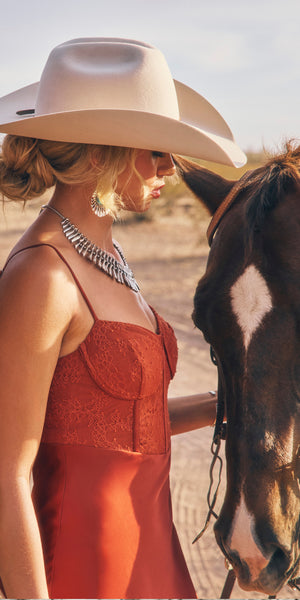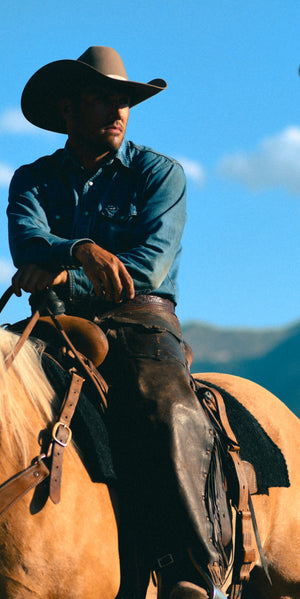
To celebrate Mental Health Awareness Month, Tru Western sat down with the Executive Director of the Western Sports Foundation, Aubrey O'Quin, to discuss the organization's services, future goals, and why mental wellness is at the forefront of the entire conversation.
***
Tru Western: Could you expand more upon the Western Sports Foundation’s mission and its meaning?
Aubrey O’Quin: Our mission is to provide wellness resources to rodeo athletes at any level of competition, within any organization, to provide success both in and out of the arena. We provide the best resources so that they can become the best athletes, humans, individuals, husbands, wives, mothers, sons, and daughters possible. So, just really trying to make well-rounded human beings the best way that we can.
TW: How many athletes would you say you help a year?
AOQ: We've had a tremendous amount of growth over the last year or so. In a typical year, we're probably close to about 100 athletes. In 2022, we assisted about 270 athletes, and so far in 2023, we're close to 170 just for the first four months of the year.
TW: How many Western rodeo disciplines do you serve?
AOQ: Every rodeo discipline. Bull riding, bullfighting, barrel racing, calf roping, steer wrestling, saddle bronc, bareback, the whole gamut of it. In the past, we’ve helped kids that are in junior high rodeo up to the professionals. That includes pole bending and goat tying, which aren't necessarily a part of the professional world, and we've recently had conversations with the quarter horse and show horse associations. So, it's every single one of them.
TW: Sounds like you're inclusive of the whole community, which is awesome. Could you tell us a little bit more about your Wellness Clinics and what your goals are for them in the future?
AOQ: We’ve been doing Wellness Clinics since 2019. It’s a three-day clinic where we bring in all of our providers so the athletes have the chance to work with them directly. We typically cap the clinics at 25 athletes to keep it as more of an intimate setting. We talk about finances, mental health, life crises—things like that. Those are hard conversations to have in even a one-on-one setting, so we found that keeping smaller groups allows for more open conversation and fewer distractions.
Over the course of those three days, clinics are intermixed with workouts that can be done on the road with our trainer, classroom settings with each of our providers, followed by small group breakout sessions. If they have questions that they want to ask our providers, then that is available to them as well.
The nice thing about these clinics is they're free of charge to the athletes. We cover the cost of the facility, the cost for the providers to be there, breakfast and lunch for the three days, as well as hotel accommodations. The athlete just needs to get themselves to the clinic—this allows them a chance to invest in themselves without having to break the bank to do it. Often, if rodeo athletes have the choice between putting gas in their truck and getting to the next rodeo or coming to a Wellness Clinic, they're going to put gas in their in the truck because that's their livelihood. So, we are trying to take the financial burden out of the equation by providing our services free of charge.
My overall goal within the next five years is for every junior high, high school, and college rodeo athlete to have heard of us and understand our services--who we are, what we are, and what we do. So then, as they go on to either professional rodeo, or whatever they decide to do after their rodeo career, they already have those skill sets and tools to go out and become successful individuals. As adults, we think we already know everything, so we want to get to them before they have that mindset.
TW: How often do you hold Wellness Clinics, and how does one become an eligible candidate?
AOQ: This year we will do a total of four of our larger clinics. We've also done a mini Wellness Clinic with the College Rodeo team, and we’re going to do another mini-clinic at the junior high and high school Rodeo finals. Those all take place in Frisco, TX at the Academy at the Stars, so right where the Dallas Cowboys work out. It's an amazing facility.
As we continue to increase our funding and increase outreach, then we'll increase the number of clinics as well. At this point, people mostly discover the clinics through word of mouth and social media. We're very lucky that our providers and our mentors are so well-connected within the industry. Most of the athletes leave our clinics with such life and mind-altering experiences that they end up going and telling their buddies. We typically see the next clinic fill up fairly quickly.
TW: Since this article is being published during Mental Health Awareness Month, can you expand a little bit on the WSF services that specifically cater to mental wellness?
AOQ: When we initially launched in 2018, we had identified the five areas of Wellness that we wanted to focus on, and mental wellness was one of them. It was at the forefront of what we wanted to focus on. This was on the coattails of one of PBR’s best Bull Riders (Ty Pozzobon) taking his own life. His family donated his brain, and he was the first confirmed rodeo athlete to have CTE.
Chronic Traumatic Encephalopathy (CTE) Chronic traumatic encephalopathy (CTE) is a progressive and fatal brain disease associated with repeated traumatic brain injuries (TBIs), including concussions and repeated blows to the head. It is also associated with the development of dementia. (Source: Alzheimer’s Association)
Unfortunately, the only way really to diagnose somebody is after they've passed away. So when it happened, it really shook the rodeo and PBR world, and it shook me on a personal level too. I know exactly where I was when his mother called me and told me that it happened. So, that became something that my board, and everybody within the PBR community, became very passionate about—we're going to do everything that we can to stop that and prevent that from ever happening again.
Amongst our providers, we have an amazing sports neurologist, Dr. Alessi who works at the University of Connecticut’s, and has worked closely with the PBR sports medicine team in developing their concussion protocol. He has also worked with USA Boxing and MMA fighters, so he is very knowledgeable about high-impact sports. I feel very blessed and fortunate that he's a part of our program because he really understands how to speak to the athletes.
We also work with sports psychologists. I think anybody that has been an athlete at any point, whether they've gone professional, or it's just been at the high school or collegiate level, understands the pressure associated with playing sports. For rodeo athletes, it’s an individual sport in most situations, so you have nobody else to blame but yourself if you're not performing well. And, so, it's very easy to carry that load and not know how to manage it--when it’s tied to your livelihood, it can quickly spiral out of control. So, sports psychology is crucial to give athletes the tools to better understand what that is--whether it's meditation beforehand, meditation, positive self-talk, or even trauma associated with a physical injury. We have a company that we work with that offers confidential counseling services over the phone 24 hours a day, seven days a week. They'll have a conversation with somebody who has a master’s degree or higher, they'll identify the problem, and then they’ll find someone that they can go to in person based on their location.
We also offer support groups—mostly for the families of athletes. Major life events can be difficult on the wives, husbands, mothers, etc., too, so we want to be sure that we're able to offer the tool sets for the support system on how to handle that, how to have those conversations, and how to also take care of themselves while they're taking care of their athlete.
Finally, we've recently added a mental mindset coach--it's like sports psychology but with a larger focus on positive thinking through visualization and affirmations. We’re very lucky to have some of the best providers within their specific industries. Most of our providers in some way, shape, or form, have either been rodeo athletes or are married to one. Our mental mindset coach was a barrel racer, her daughter is going to college for rodeo, and her husband is a head rodeo coach--she lives it, breathes it, understands it.”
All conversations with our specialists are confidential--anything that happens between our doctors and athletes stays between them—nothing is being reported back to their organizations or to other contestants. Our services are meant to inform them about their brain health so that they can make an educated decision as to what they want to do next.
TW: How is WSF working to help end the stigma surrounding mental health?
AOQ: I think our success has not just been in providing a safe space for athletes to receive help, but also to feel comfortable in sharing their story with others—it can make a world of difference in someone’s life.
One of the unique things about rodeo is it's a family. Everybody lifts each other up in those hard times and they celebrate each other in the great times. They’re going to be the first ones to recognize when something is off.
It’s important that athletes participate in removing the stigma surrounding mental health conversations and talking to each other. It’s a lot easier to have a discussion about something you’re struggling with than a fatal alternative because they weren’t aware of the support and resources available to them. Sharing your story can make a world of difference in somebody’s life.
Think of your brain the same way you’d think of any other injury. Take the time to care for it in the same way you would any other muscle or bone in your body. And let us be there to help you so it’s not so much of a financial strain.
***
If you or someone you know is an athlete who would benefit from the Western Sports Foundation’s Wellness Clinics or other available services, we encourage you to reach out to the incredible people at WSF through their website or to Aubrey directly at aoquin@westernsportsfoundation.org. All services are confidential and free of charge.
For every purchase made through the Tru Western website, one dollar is donated to the Western Sports Foundation in support of its mission to better the Western community.


0 comments